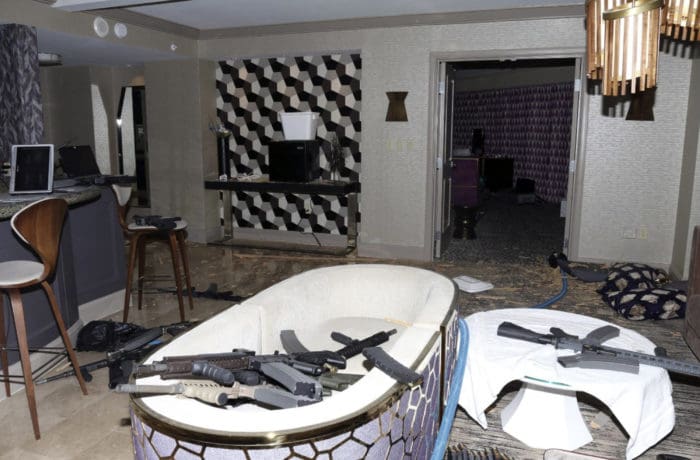Gun manufacturers face never-ending attempts to pierce the protections given them by federal law when their lawfully-sold products are used by criminals. The Protection of Lawful Commerce in Arms Act was signed into law to prevent gun makers from being sued into bankruptcy by plaintiffs’ attorneys and gun control orgs.
The latest attempt to pierce that protective legal veil is coming from US District Court Judge Andrew P. Gordon in a lawsuit filed by survivors and family members of victims in the Mandalay Bay shooting in Las Vegas. He’s asking a Nevada court to rule whether the AR-15 rifles and bump stocks used by the killer meet the definition of machine guns (see our earlier post on Judge Gordon’s flawed reasoning here).
Now Gordon wants the Nevada Supreme Court to decide the matter.
Here’s the AP’s report . . .
By Ken Ritter, AP
A U.S. judge is asking Nevada’s highest court to decide whether state law allows gun manufacturers and sellers to be held liable for deaths as he considers a lawsuit from the parents of a victim of the deadliest mass shooting in the nation’s modern history.
Federal law generally protects gun manufacturers and dealers when crimes are committed with their products. A negligence and wrongful death lawsuit filed last year in Las Vegas accuses eight firearms makers and several shops in Nevada and Utah of letting weapons be easily modified to fire like automatic weapons.
A shooter in 2017 outfitted weapons with “bump stock” attachments that let him fire in rapid succession from a Las Vegas high-rise hotel into an open-air concert crowd, killing 58 people and injuring hundreds of others.
U.S. District Judge Andrew Gordon asked last month for the ruling from the Nevada Supreme Court, saying there are “important public policy ramifications.” A hearing has not yet been set.
“I am particularly concerned,” Gordon wrote, that attorneys for the gun makers argued they would be immune from liability under state law even if they “manufactured and sold Tommy guns or M-16 rifles to civilians.”
Attorneys for Colt’s Manufacturing Co. and 11 other defendants did not immediately respond to telephone and email messages.
James and Ann-Marie Parsons of Seattle, whose 31-year-old daughter Carolyn Lee “Carrie” Parsons died in the shooting, are seeking unspecified monetary damages. Their lawyer, Richard Friedman, said Tuesday that “federal law provides a lot of immunity, but not total immunity.”
“We’re saying you were selling guns that meet the definition of machine guns in violation of federal law, so you don’t get protection,” he said.
The Trump administration banned bump stocks last year, making them illegal under the same federal laws that prohibit machine guns.
Friedman said a federal judge deferring to the state high court is uncommon but not unprecedented and acknowledged that the Parsons’ lawsuit could hinge on the decision by the Nevada justices.
The Las Vegas shooter killed himself before police blasted through the door of his 32nd floor suite at the Mandalay Bay resort. Police and the FBI say that while it appeared he sought notoriety, they could not identify any “single or clear motivating factor” for the meticulously planned attack.
The owner of the hotel, MGM Resorts International, reached a sweeping out-of-court settlement last October, agreeing to funnel up to $800 million to the families of the victims.
The agreement resolved lawsuits in at least 10 states, but MGM Resorts acknowledged no liability or guilt for the massacre.
